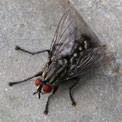The NaturePlus Forums will be offline from mid August 2018. The content has been saved and it will always be possible to see and refer to archived posts, but not to post new items. This decision has been made in light of technical problems with the forum, which cannot be fixed or upgraded.
We'd like to take this opportunity to thank everyone who has contributed to the very great success of the forums and to the community spirit there. We plan to create new community features and services in the future so please watch this space for developments in this area. In the meantime if you have any questions then please email:
Fossil enquiries: esid@nhm.ac.uk
Life Sciences & Mineralogy enquiries: bug@nhm.ac.uk
Commercial enquiries: ias1@nhm.ac.uk
Manage categories
Add a new category
Edit category
CloseCreate and manage categories in True flies. Removing a category will not remove content.
Categories in True flies
Manage Announcements
Add a new announcement
Edit Announcement
CloseCreate and manage announcements in True flies. Try to limit the announcements to keep them useful.
Announcements in True flies
| Subject | Author | Date | Actions |
|---|
Enter your announcement details below, including when you would like it to become active and expire. By default, announcements will become active immediately and expire in 7 days.
 Loading...
Loading...
About true flies

True flies include crane-flies, mosquitoes, midges, horse-flies, hover-flies, blow-flies and house-flies.
Unlike the majority of insects flies do not possess the usual two pairs of wings but have only a single, membranous pair.
Some families of flies, such as hover-flies, are brightly coloured and conspicuous. These are often seen feeding on flowers.
Adult flies feed on liquids including fluids from decaying animals, plants and animal dung, nectar and the blood of birds and mammals. A handful of species associated with humans and farming practices are able to spread bacterial diseases. Many others are a nuisance in high numbers, particularly the biting species of mosquitoes, midges and horse-flies.
The larvae of the majority of fly species play a vital role in the decomposition of dead animals and plants
Number of UK species: about 6,600
Whats new?
Refresh this widgetWho we are
These forums are looked after by scientists and experts in the Museum’s Identification and Advisory Service.
Our fossil, rock, plant and insect experts are dedicated to answering your natural history questions.
Our names on this forum are:
Former team members:
Related information
Top participants
- Contact and enquiries
- Accessibility
- Website terms of use
- Information about cookies
- © The Trustees of the Natural History Museum, London


